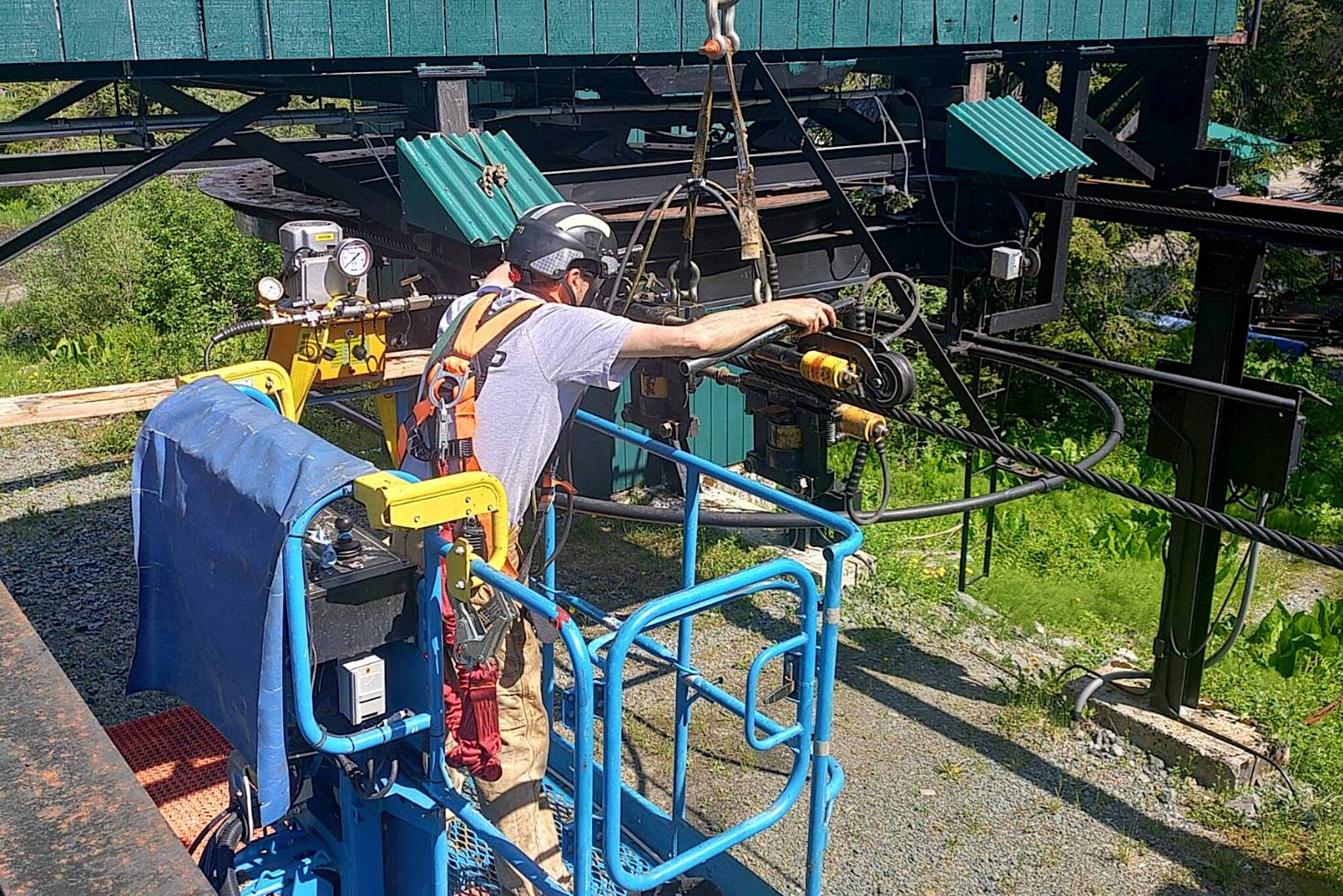The gondola at Eaglecrest can be completed on time and on budget, if some features are scaled back and upcoming installation work is fast-tracked, Juneau Assembly members were told Monday night.
An update on the status of the gondola — which has experienced setbacks and controversy since it was purchased two years ago — was presented by City Manager Katie Koester during an Assembly Committee of the Whole meeting. Higher-than-expected costs and possibly significant installation delays are among the most notable issues, with questions about leadership and the ski area’s future direction being raised in recent weeks due to the forced resignation of longtime manager Dave Scanlan.
The gondola is currently “at 35% design,” major components have been purchased, and $7 million of the $12.5 million budgeted remains for the project at the ski area owned by the City and Borough of Juneau, Koester said. She said completing by the target date of summer of 2026 is still possible, but that will mean omitting some features in the initial design.
“CBJ engineering and Eaglecrest is really taking the project down to what we’ll call the backbone infrastructure, which just is the gondola,” she said. “So let’s not design the bars and the ski lodges at the top yet. Goldbelt is confident they can sell that destination with a windbreak and some porta-potties because it really is a world-class destination.”
Additional amenities can be added — and ticket prices increased — once the gondola begins operating at a profit, or additional funds are invested in the facility, Koester noted.
The initial cost estimate for the gondola was developed by Scanlan in 2022 and “normally (being at) 35% design would get us relatively accurate cost estimates,” Koester wrote in a memo presented to Assembly members before the meeting.
“However, this project has many unknowns compared to developing a road or constructing a building,” she wrote. “Every gondola installation has a unique profile, and Eaglecrest’s gondola to the west end of Pitman’s Ridge is no exception.”
Among the uncertainties in cost and completion schedule are design decisions that still need to be made and whether companies will submit bids for the work within official projections, according to Koester. She stated opening the gondola by the summer of 2026 is still feasible if work such as building access roads and some pre-assembly is fast-tracked this summer, but it is by no means assured.
“It’s definitely aggressive and ambitious,” she said. “But what Eaglecrest staff has pointed out is it’s all well and good to turn a gondola by 2026. But you have to know that the gondola works, you have to work out the kinks, you have to have staff training, you have to have safety measures in place, you have to have sold those tickets. You have to have done all of those things in advance and a full season might not be more realistic until 2027.”
City officials will likely have a preliminary estimate of the final cost this fall after preconstruction services are completed, but “a guaranteed maximum price will not be negotiated until the project approaches final design (mid-March),” Koester wrote in her memo.
“If additional funds are needed, it would be defensible to use a loan from passenger fees, though this has not yet been broached with industry,” she added, referring to the $13 in taxes each Juneau passenger pays as part of their ticket. The cruise industry has challenged Juneau’s spending of some such funds as violating the defined intent of “infrastructure and services that further the marine enterprise/operation of such vessels.”
Most of the gondola’s cost is being funded by Goldbelt Inc., which provided a $10 million lump sum payment to the city in exchange for a share of revenues for at least 25 years. Goldbelt President and CEO McHugh Pierre, in a speech last month to the Greater Juneau Chamber of Commerce, said “I’m not sure that we’re on target to achieve” a summer 2026 debut, but a 2027 opening is “still within our window of expectation.”
The agreement with CBJ states Goldbelt can back out if the gondola isn’t open by May 31, 2028, a revision made earlier this year that delays the original deadline of May 31, 2027. If the agreement proceeds Goldbelt will get between 10% and 25% of the gondola’s gross revenue for at least 25 years, with Goldbelt able to extend the agreement if the company has not received at least $20 million during that period.
The gondola is part of a larger-scale plan by Eaglecrest to expand into year-round operations that seek to take advantage of Juneau’s large-scale summer cruise tourism. The plan, which received a conditional use permit from the Juneau Planning Commission in February, includes mountain bike trails, a snowtubing park, a picnic pavilion and other upgrades.
Koester noted some large-scale summer tourism activities are already taking place at Eaglecrest since it “currently serves 350 to 390 visitors each time a Viking cruise line calls” via a nature walk shore excursion offered by the company. However, in response to a question from an Assembly member, she acknowledged efforts to step up such offerings in the summer of 2025 are among the uncertainties Eaglecrest is facing.
“I think they’ve been struggling with the obstacles and the challenges so they’ve gone back and forth as well,” but it’s “still on the table,” she said.
Eaglecrest’s board of directors is currently seeking a new general manager and during the interim Kirk Duncan, who formerly held the position, has been brought in as an advisor for the gondola, advice on preparing for this winter’s season and other assistance, Koester said.
• Contact Mark Sabbatini at mark.sabbatini@juneauempire.com or (907) 957-2306.

